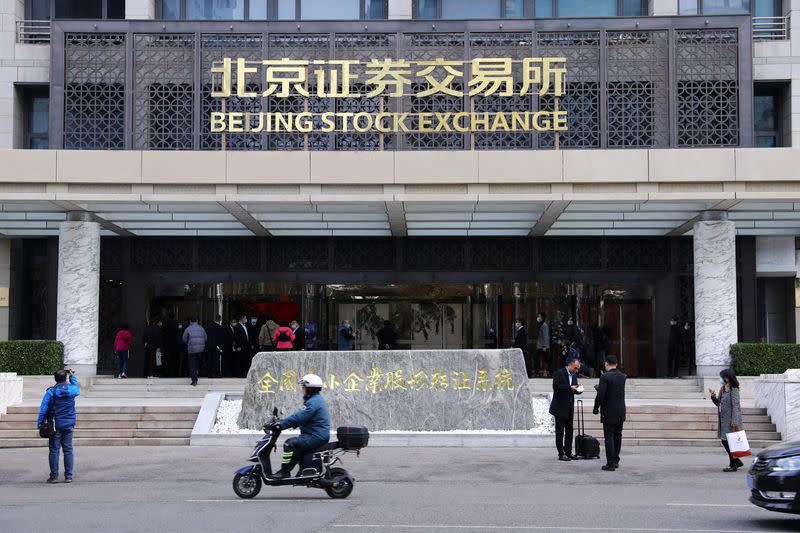Waning China euphoria dents Europe and hammers Hong Kong

By Harry Robertson and Rae Wee
LONDON/SINGAPORE (Reuters) -A lack of details on China's long-awaited fiscal stimulus caused a rally in Chinese shares to fizzle on Tuesday, sending Hong Kong stocks tumbling and dragging down European companies and oil prices.
Other factors were also at play as markets kept a close eye on the widening conflict in the Middle East and the likely pace of Federal Reserve rate cuts after strong U.S. jobs data on Friday.
China's CSI300 blue-chip index surged 10% in early trade to its strongest since July 2022, as the country's markets reopened after the week-long National Day holiday.
Yet the index fell back - finishing 5.9% higher - after the chairman of China's economic planner Zheng Shanjie provided little detail of fresh fiscal stimulus to complement the burst of monetary stimulus announced two weeks ago.
Hong Kong's Hang Seng Index slumped 9.4%, giving up some of the big gains it made during the Chinese holiday, in a sign of profit-taking and waning investor patience.
"Markets were hoping to obtain some guidance on the size of fiscal stimulus," said Rong Ren Goh, a portfolio manager at Eastspring Investments.
"It is likely we see markets consolidating and digesting what has already been announced, which arguably is meaningful, but not quite enough to satiate lofty expectations."
European shares fell, with China-sensitive mining and luxury companies among the biggest losers.
The continent-wide Stoxx 600 index was down 0.9%, while Germany's DAX was 0.8% lower and Britain's FTSE 100 fell 1.3%.
"Essentially the markets were anticipating China would announce a bit more detail on the fiscal stimulus measures," said Aneeka Gupta, director of macroeconomic research at WisdomTree.
"Clearly that has not panned out as they've reopened today, and I think that's having a bit of a dampening impact on European stocks."
Europe was also taking a lead from a 1% drop in U.S. shares on Monday, driven by a fall in tech companies as angst about Fed rate cuts and the Middle East took a toll. Futures for the U.S. S&P 500 index were slightly higher on Tuesday, pointing to a muted open.
OIL PRICES DIP
Oil prices pared some of their gains after jumping on Monday due to the widening conflict in the Middle East as well as concerns about supply disruptions due to storms in the United States.
Brent crude futures were last down 1.9% at $79.41 a barrel, having surged above $80 a barrel for the first time in more than a month in the previous session.
Hezbollah on Monday fired rockets at Israel's third-largest city, Haifa, and Israel looked poised to expand its offensive into Lebanon, one year after the devastating Hamas attack on Israel that sparked the Gaza war.
The key question, Gupta said, is whether Israel will strike back against Iran by hitting its oil production sites after its rocket attack last week, and what effect Chinese stimulus will have on global energy demand.
Yields on benchmark 10-year U.S. government bonds hovered above the 4% level after rising over the last two sessions in the wake of Friday's surprisingly strong U.S. jobs report.
Traders are now pricing in a roughly 10% chance the Fed could hold rates next month and see around 50 basis points of cuts over the rest of the year.
The dollar was on the back foot, falling 0.27% against the Japanese yen to 147.78, while the euro was up 0.1% at $1.0985.
(Reporting by Harry Robertson, Rae Wee and Vidya Ranganathan; Editing by Neil Fullick, Jacqueline Wong and Christina Fincher)

 Yahoo Finance
Yahoo Finance 